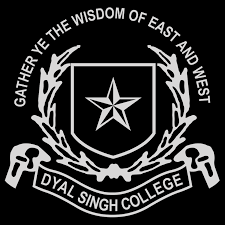MASTERS OF SCIENCE [M.SC]
2 Years
M.Sc. (Master of Science) – Dyal Singh College
The M.Sc. program at Dyal Singh College is designed for students seeking advanced knowledge and research skills in the sciences. This course is ideal for students who have completed their undergraduate degree in science (B.Sc.) and wish to specialize in subjects like Physics, Chemistry, Mathematics, Zoology, Botany, and more.
Duration and Structure
-
Duration: 2 years (4 semesters)
-
System: Semester-based
-
Mode: Full-time postgraduate degree
-
Type: Specialized study with an emphasis on research, experiments, and in-depth theoretical learning
M.Sc. Courses Offered at Dyal Singh College
Dyal Singh College offers M.Sc. programs in a range of disciplines, focusing on providing students with both theoretical understanding and practical skills that can be applied in industry, academia, and research.
-
M.Sc. Chemistry
-
Specializations may include Organic Chemistry, Inorganic Chemistry, Physical Chemistry, and Analytical Chemistry.
-
Emphasis on research skills, laboratory work, and chemical analysis.
-
-
M.Sc. Physics
-
Specializations in Solid State Physics, Quantum Mechanics, Nuclear Physics, Optics, and Electromagnetic Theory.
-
Strong focus on theoretical knowledge and experimental techniques.
-
-
M.Sc. Mathematics
-
Specializations may include Pure Mathematics, Applied Mathematics, Statistics, Probability Theory, and Numerical Methods.
-
In-depth coverage of mathematical theories and problem-solving techniques.
-
-
M.Sc. Zoology
-
Focus on Animal Physiology, Genetics, Evolutionary Biology, Ecology, and Biotechnology.
-
Special emphasis on research in animal biology, conservation biology, and applied zoology.
-
-
M.Sc. Botany
-
Specializations in Plant Taxonomy, Genetics, Plant Physiology, Biotechnology, and Ecology.
-
Emphasis on research-based learning, experimental biology, and environmental science.
-
Course Components
The M.Sc. program consists of core courses, elective courses, and research projects:
-
Core Courses:
-
These are compulsory papers that cover the foundational topics of the respective field (e.g., Organic Chemistry, Quantum Mechanics, Ecology).
-
-
Elective Courses:
-
Students choose from a variety of electives to specialize in a particular area of their subject (e.g., Biostatistics, Polymer Chemistry, Quantum Field Theory).
-
-
Research Project/Dissertation:
-
A major component of the final semester involves conducting independent research in a chosen field. Students are required to submit a dissertation based on their research work.
-
-
Practical and Laboratory Work:
-
A significant portion of the curriculum involves laboratory work, where students perform experiments, collect data, and analyze results.
-
-
Seminars and Workshops:
-
Students attend seminars, workshops, and conferences to engage with contemporary research trends and to develop their communication skills in scientific presentations.
-
Eligibility and Admission
-
Eligibility:
-
B.Sc. (Hons.) or equivalent undergraduate degree in the relevant subject (e.g., B.Sc. Physics for M.Sc. Physics, B.Sc. Chemistry for M.Sc. Chemistry) with a good academic record.
-
A minimum percentage or CGPA requirement may apply, depending on the specific course.
-
-
Admission Mode:
-
Admission is based on entrance exams (conducted by the University of Delhi or the respective department) or merit-based depending on the number of applicants and the specific course.
-
Why Choose M.Sc. at Dyal Singh College
-
Research-Focused Education: The M.Sc. programs offer a research-intensive environment with access to well-equipped labs and research projects.
-
Experienced Faculty: Professors with expertise in their respective fields guide students in both academic learning and research.
-
Advanced Knowledge: The programs are designed to deepen knowledge in specialized fields, making graduates highly skilled for industry and academia.
-
Interdisciplinary Approach: Students are encouraged to explore interdisciplinary connections between their field and other areas of science.
-
Vibrant Campus Life: The college offers a range of academic societies, science clubs, and events that promote intellectual development outside the classroom.
Career Opportunities After M.Sc.
-
Higher Studies:
-
M.Phil., Ph.D., or other advanced degrees in specialized areas of study.
-
-
Research and Development:
-
Graduates can work in research institutions, universities, and labs such as CSIR, ICMR, DRDO, and ISRO.
-
-
Academia:
-
After further qualification, students can pursue teaching careers in schools, colleges, and universities.
-
-
Industry Jobs:
-
M.Sc. graduates are highly sought after in industries like pharmaceuticals, chemical manufacturing, biotech, and environmental science.
-
Careers in data science, software development, biomedical sciences, and environmental consulting.
-
-
Government Jobs:
-
Graduates can apply for government positions like research officers, scientific assistants, and civil services exams (UPSC, SSC).
-
-
Entrepreneurship:
-
With specialized knowledge, M.Sc. graduates can start their own ventures in fields like biotech, research consulting, or education.
-
Why Choose M.Sc. Over B.Sc.?
-
In-depth Knowledge: The M.Sc. program provides an advanced understanding of your chosen discipline, making you an expert in the field.
-
Research Opportunities: M.Sc. students have the opportunity to engage in high-level research, which is critical for those interested in academia or scientific discovery.
-
Better Career Prospects: An M.Sc. degree opens up higher-paying and more specialized career options, especially in R&D, academia, and industry leadership roles.
-
Higher Education: M.Sc. is often a prerequisite for pursuing Ph.D. programs in universities and research institutes.






 OMAWATI686b96fcc7a5c.jpg)